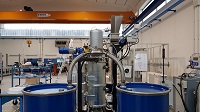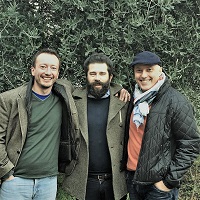You have probably heard the news by now: plastic is everywhere. It is polluting our water, oceans, soils, even our own intestines — and it is very difficult to recycle properly.
Swiss company plastic recycling - Arhive
Swiss company’s approach to plastic recycling ‘like unmaking pasta’

At least it was, until Gr3n, a Swiss company based in Lugano, invented a new chemical process to recycle PET, a plastic present in bottles and food containers.
PET is difficult to recycle because it is made of mixed materials.
Gr3n is one of 10 projects nominated for the 2018 Innovation Radar prize in the Tech for Society category.Swiss company plastic recycling
“Currently, almost 90% of the plastic in textile and food packaging is not really recyclable”, said Matteo Bertelè, one of Gr3n’s co-founders.
“That’s because recycling systems use the mechanical recycling process, in which various plastic items are melted together and turned into small flakes of mixed plastic. But this mix cannot produce the same items it came from,” he added.
Mr Bertelè, who is Italian, likes to compare this process to pasta: “If you make pasta and put tomato sauce or ragù in it, the pasta becomes ‘contaminated’ by the sauce, you can’t separate them again.” Swiss company plastic recycling
Unlike mechanical recycling, Gr3n’s process, called Dem3to, can separate the different types of plastics, he said. Swiss company plastic recycling
“Our process is putting the pasta into the reactor, and it comes out as water and flour, the original pasta ingredients. Then we can make pasta — well, plastic — again.”
The separation of the monomers, which together forms the plastic material (polymer) is nothing new, but depolymerisation consumed far more energy than mechanical recycling.
Gr3n’s reactor makes it more efficient and less energy-consuming thanks to Bertelè’s team’s discovery — when applied with microwave vibrations, polymer gets “excited” and its group of molecules can be broken down to monomers again.
Gr3n started its research in 2011 and has since then received €12 million in funds through the European Commission’s Horizon 2020 programme.Swiss company plastic recycling

Before the end of the year, Gr3n will start testing its recycling technique on items made by various partnering brands: first plastic bottles from Coca-Cola and Nestlé, then Ikea carpets and H&M textiles. Swiss company plastic recycling
Other “stakeholders” include Adidas, Suez and Unilever. Pepsi and L’Oreal have also expressed interest. Swiss company plastic recycling
In the long run, Bertelè hopes that Gr3n will sell the Dem3to machines directly to big plastic manufacturers, so that they will “source their plastic waste and produce virgin plastic.”
The European Commission’s Innovation Radar Prize 2018 in the Tech for Society category recognises new technologies impacting society and citizens, developed in EU-funded research and innovation projects. Swiss company plastic recycling
Other nominees in this category are Friedrich-Schiller-University JENA, Ifinity, Health Leads, Electronic Record Services, University of Iceland, CNET Svenska, CERTH/ITI, Signum Bildtechnik, and Fraunhofer Institute for Intelligent Analysis and Information Systems IAIS.
You can vote online for the project of your choice.
